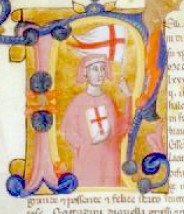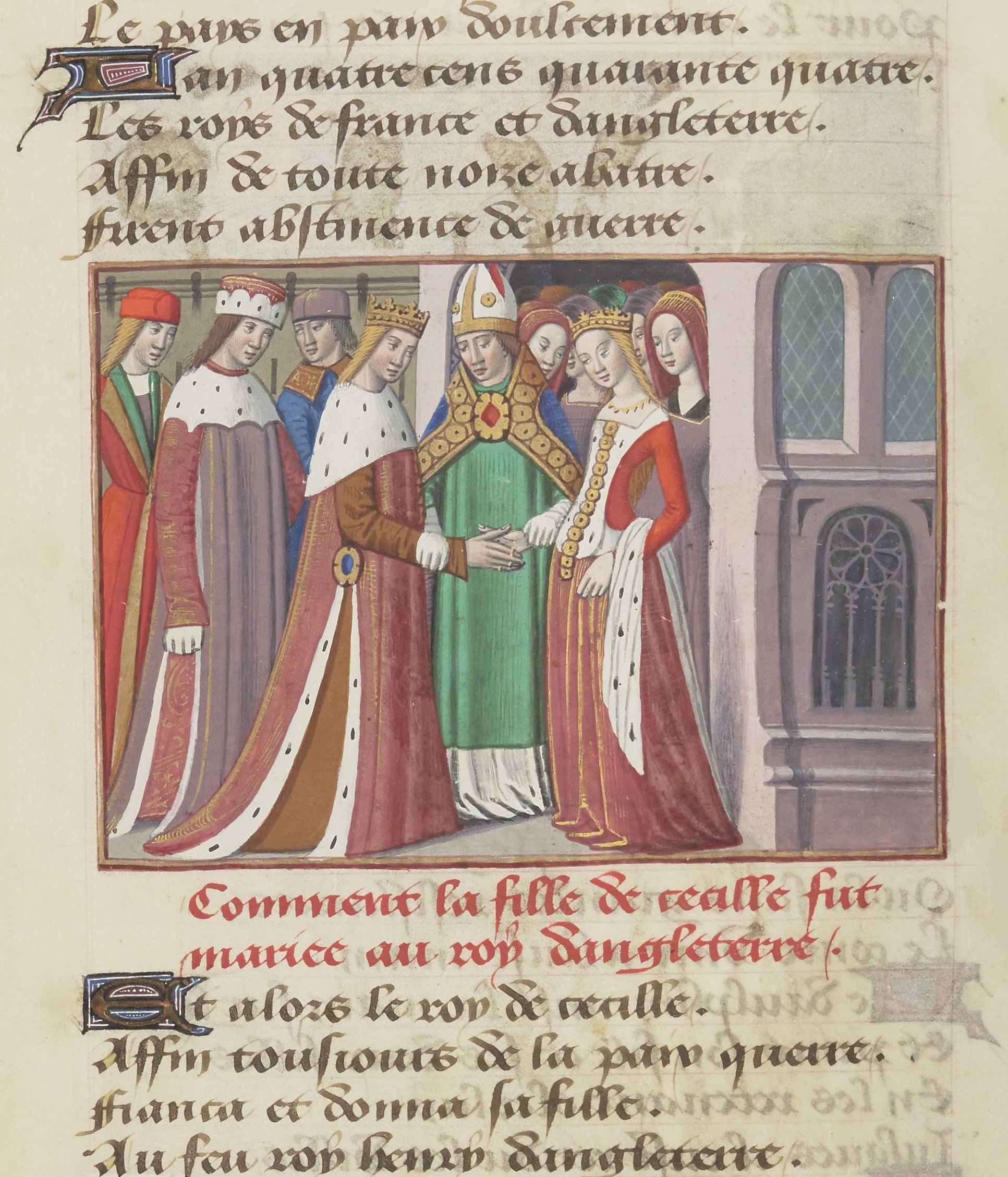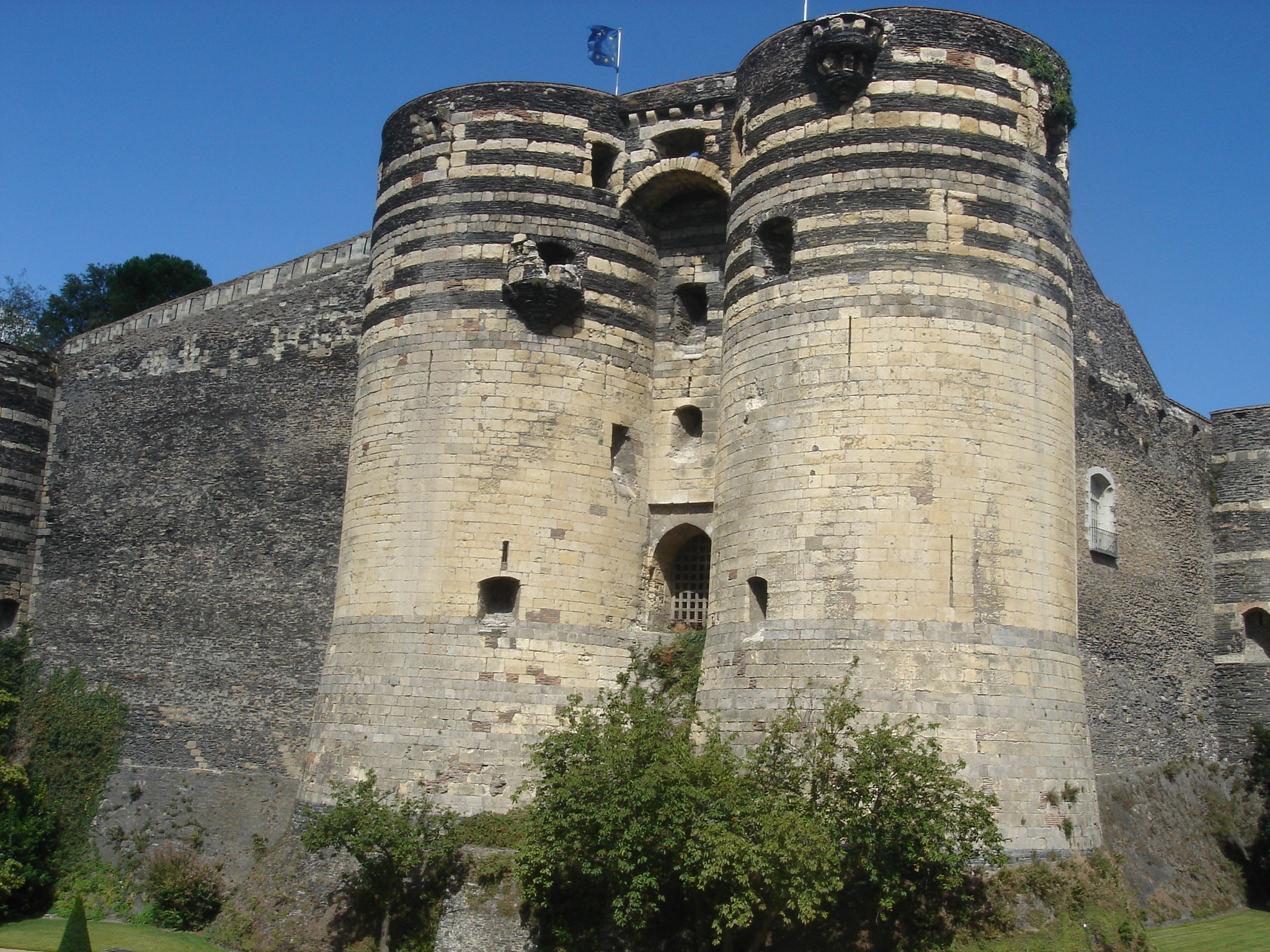|
Andrea De' Pazzi
Andrea di Guglielmo de' Pazzi (1372, Florence - 19 October 1445) was an Italian politician of Republic of Florence, known for having commissioned the Pazzi Chapel from Filippo Brunelleschi and for being the father of Jacopo de' Pazzi and the grandfather of Francesco and Guglielmo de' Pazzi. Biography Andrea de' Pazzi was born in Florence in 1372, son of Guglielmo de' Pazzi and Costanza de' Bardi, two prestigious dynasties of wealthy bankers, belonging to the Guelph political faction. Andrea began his political career in 1411 as Councilor of the Republic. In 1413 he was Captain of the Guelphs. Esteemed by his fellow citizens, he directed numerous diplomatic missions, including the one to make agreements with the then pope John XXIII Cossa, while in 1420 he was ambassador in Genoa. In 1431 and 1438 he was Consul of the Mint and in 1432 Podestà of the municipalities of Segna and Campi. However, his career was hampered by the fact that the Pazzi family belonged to the list of '' ... [...More Info...] [...Related Items...] OR: [Wikipedia] [Google] [Baidu] |
Republic Of Florence
The Republic of Florence (; Old Italian: ), known officially as the Florentine Republic, was a medieval and early modern state that was centered on the Italian city of Florence in Tuscany, Italy. The republic originated in 1115, when the Florentine people rebelled against the Margraviate of Tuscany upon the death of Matilda of Tuscany, who controlled vast territories that included Florence. The Florentines formed a commune in Rabodo's (Matilda’s successor) successors' place. The republic was ruled by a council known as the Signoria of Florence. The signoria was chosen by the (titular ruler of the city), who was elected every two months by Florentine guild members. During the Republic's history, Florence was an important cultural, economic, political and artistic force in Europe. Its coin, the florin, was the dominant trade coin of Western Europe for large scale transactions and became widely imitated throughout the continent. During the Republican period, Florence was al ... [...More Info...] [...Related Items...] OR: [Wikipedia] [Google] [Baidu] |
Giano Della Bella
Giano Della Bella (c. 1240 Florence - France, before 19 April 1306) was a late thirteenth century Florentine politician and a leader of the revolt that brought in the Ordinances of Justice which entrenched the power of the Florentine guilds by excluding aristocrats from power in Florence. He was born in the family castle within Florence into a Ghibelline (pro Holy Roman Emperor) family, although he became a Guelph and a populist. In 1294 he was podestà of Pistoia. He is the protagonist of the first chapters of Dino Compagni's ''Nuova Cronica'' and is also mentioned by Dante in Paradise. He was of noble birth but also a member of the Arte di Calimala The Arte di Calimala, the guild of the cloth finishers and merchants in foreign cloth, was one of the greater guilds of Florence, the ''Arti Maggiori'', who arrogated to themselves the civic power of the Republic of Florence during the Late Middle ..., the wool merchant's guild. References Politicians from Florence 13th-ce ... [...More Info...] [...Related Items...] OR: [Wikipedia] [Google] [Baidu] |
Italian Bankers
Italian(s) may refer to: * Anything of, from, or related to the people of Italy over the centuries ** Italians, a Romance ethnic group related to or simply a citizen of the Italian Republic or Italian Kingdom ** Italian language, a Romance language *** Regional Italian, regional variants of the Italian language ** Languages of Italy, languages and dialects spoken in Italy ** Italian culture, cultural features of Italy ** Italian cuisine, traditional foods ** Folklore of Italy, the folklore and urban legends of Italy ** Mythology of Italy, traditional religion and beliefs Other uses * Italian dressing, a vinaigrette-type salad dressing or marination * Italian or Italian-A, alternative names for the Ping-Pong virus, an extinct computer virus * ''Italien'' (magazine), pro-Fascist magazine in Germany between 1927 and 1944 See also * * * Italia (other) * Italic (other) * Italo (other) * The Italian (other) * Italian people (other) Italian ... [...More Info...] [...Related Items...] OR: [Wikipedia] [Google] [Baidu] |
1445 Deaths
Year 1445 ( MCDXLV) was a common year starting on Friday of the Julian calendar. Events January–March * January 1 – In northern India, Ala-ud-Din Alam Shah becomes the new Sultan of Delhi upon the death of his father, Muhammad Shah IV. * January 13 – King Henry VI of England summons the English Parliament for the first time in almost three years, directing the Lords and the members of the House of Commons to assemble at Westminster on February 25. * January 19 – In Poland, the Duchy of Oświęcim, ruled jointly since 1434 by the three sons of the late Duke Casimir of the Piast dynasty, is divided between the three brothers. Wenceslaus I, the eldest, receives the Duchy of Zator, Przemysław becomes ruler of Toszek and Jan IV, the youngest of the brothers, receives the capital, Oświęcim, along with the towns of Kęty and Żywiec. * February 25 – The English Parliament is opened by King Henry IV. On the first day, the House of Commons ... [...More Info...] [...Related Items...] OR: [Wikipedia] [Google] [Baidu] |
1372 Births
Year 1372 ( MCCCLXXII) was a leap year starting on Thursday of the Julian calendar. Events January–December * March 12 – Saint Bridget sets out on a pilgrimage to the Holy Land, staying in Cyprus until May 12. In August, she is in Bethlehem where she sees a vision of Jesus' birth. In September, she sets sail for Naples, where she arrives in December. * May – Owain Lawgoch makes a second attempt to take the throne of Wales, sailing with French support from Harfleur. Whilst attacking the island of Guernsey, he abandons the invasion in order to fight for France at La Rochelle. * June 22 – Battle of La Rochelle: The French and the Castilians defeat the English. The French gain control of the English Channel for the first time since 1340. * July 10 – The Treaty of Tagilde is signed between Ferdinand I of Portugal and representatives of John of Gaunt of England, marking the beginning of the Anglo-Portuguese Alliance, which remains in effect into th ... [...More Info...] [...Related Items...] OR: [Wikipedia] [Google] [Baidu] |
Medici (TV Series)
''Medici'' () is a historical drama television series created by Frank Spotnitz and Nicholas Meyer. The series was produced by Italian companies Lux Vide and Rai Fiction, in collaboration with Spotnitz's Big light productions, Big Light Productions. The series follows the House of Medici, bankers of the Pope, in History_of_Florence#Renaissance, 15th-century Florence. Each season follows the events of a particular moment of the family's history exploring the political and artistic landscape of Italian Renaissance, Renaissance Italy. The first season of the series, titled ''Medici: Masters of Florence'', premiered in Italy on Rai 1 on 18 October 2016. It takes place in 1429, the year Giovanni di Bicci de' Medici, Giovanni de' Medici, head of the family, died. His son Cosimo de' Medici, Cosimo succeeds him as head of the family bank, the richest in Europe at the time, and fights to preserve his power in Florence. The series reached between four and eight million viewers on original ... [...More Info...] [...Related Items...] OR: [Wikipedia] [Google] [Baidu] |
Renato De' Pazzi
Renato di Piero de' Pazzi (6 September 1442 - April 1478) was an Italian politician and banker by Republic of Florence, who died in the riots that followed the failure of the Pazzi conspiracy against the Medici family. Biography Renato de' Pazzi was born on 6 September 1442 in the Republic of Florence. He was a member of Pazzi family, one of seven children of Piero de' Pazzi and grandson of Andrea de' Pazzi. His uncles were Jacopo and Antonio de' Pazzi, and his cousins Guglielmo and Francesco de' Pazzi (sons of Antonio). He was baptized in the presence of René of Anjou, a close friend of his grandfather, and named in his honour. In 1463 he married Francesca Martini, with whom he had eight children, and held some modest positions in the city government such as Member of the ''VIII di Balia e Guardia'' (1473) and mint officer (1476). In 1478 he learned of plans by his uncle Jacopo and his cousin Francesco to eliminate the brothers Lorenzo and Giuliano de' Medici, governors ... [...More Info...] [...Related Items...] OR: [Wikipedia] [Google] [Baidu] |
Bianca De' Medici
Bianca Maria di Piero de' Medici (10 September 1445– 20 July 1505) was a member of the de' Medici family, ''de facto'' rulers of Republic of Florence, Florence in the late 15th century. She was the daughter of Piero di Cosimo de' Medici, ''de facto'' ruler of the Florentine Republic, and sister of Lorenzo de' Medici, who succeeded his father in that position. She married Guglielmo de' Pazzi, a member of the Pazzi family. She was a musician, and played the Organ (music), organ for Pope Pius II and the future Pope Alexander VI in 1460; she was a landowner. Life Bianca was a daughter of Piero di Cosimo de' Medici and Lucrezia Tornabuoni. In 1459, she married Guglielmo de' Pazzi, who was a childhood friend of her brother, Lorenzo de' Medici. This alliance was intended to help resolve the animosity between the families, but it was not successful in that regard as Machiavelli noted in his ''Florentine Histories''. Their first child, Antonio, was born in 1460. The marriage agreemen ... [...More Info...] [...Related Items...] OR: [Wikipedia] [Google] [Baidu] |
Pazzi Conspiracy
The Pazzi conspiracy () was a failed plot by members of the Pazzi family and others to displace the Medici family as rulers of Renaissance Florence. On 26 April 1478 there was an attempt to assassinate Lorenzo de' Medici and his brother Giuliano. Lorenzo was wounded but survived; Giuliano was killed. More than eighty people implicated in the plot were executed, some by hanging from the windows of the Palazzo della Signoria. The surviving Pazzi family members were banished from Florence. Background Francesco della Rovere, who came from a poor family in Liguria, was elected pope in 1471. As Sixtus IV, he was both wealthy and powerful and at once set about giving power and wealth to his nephews of the della Rovere and Riario families. Within months of his election, he had made Giuliano della Rovere (the future pope Julius II) and Pietro Riario both bishops and cardinals (including the archbishopric of Florence for Riario); four other nephews were also made cardin ... [...More Info...] [...Related Items...] OR: [Wikipedia] [Google] [Baidu] |
Arte Della Lana
The Arte della Lana was the wool guild of Florence during the Late Middle Ages and in the Renaissance. It was one of the seven '' Arti Maggiori ''("greater trades") of Florence, separate from the '' Arti Minori'' (the "lesser trades") and the '' Arti Mediane ''(the "middle trades"). The Arte della Lana dealt in woollen cloth and cooperated with the other corporations of bankers and merchants in administering the commune, both under the podestà and the Republic of Florence. The powerful Albizzi family were prominent members of the guild. History At the height of the industry the Arte della Lana directly employed 30,000 workers and indirectly about a third of Florence's population, and produced 100,000 lengths of cloth annually. The Arte della Lana saw all the processes from the raw baled wool through the final cloth, woven at numerous looms scattered in domiciles throughout the city. Like other guilds, the ''Arte'' served only to coordinate the activities of its own members ... [...More Info...] [...Related Items...] OR: [Wikipedia] [Google] [Baidu] |
René Of Anjou
René of Anjou (; ; 16 January 1409 – 10 July 1480) was Duke of Anjou and Count of Provence from 1434 to 1480, who also reigned as King of Naples from 1435 to 1442 (then Aragonese conquest of Naples, deposed). Having spent his last years in Aix-en-Provence, he is known in France as the Good King René (; ). René was a member of the House of Valois-Anjou, a cadet branch of the French royal house, and the great-grandson of John II of France. He was a prince of the blood, and for most of his adult life also the brother-in-law of the reigning king Charles VII of France. Other than the aforementioned titles, he was also Duke of Bar from the 1420s onwards and Duke of Lorraine from 1431 to 1453. Biography René was born on 16 January 1409 in the castle of Angers. He was the second son of Duke of Anjou, Duke Louis II of Anjou, Louis II of Duchy of Anjou, Anjou, King of Naples, by Yolande of Aragon, Yolanda of Kingdom of Aragon, Aragon. René was the brother of Marie of Anjou, w ... [...More Info...] [...Related Items...] OR: [Wikipedia] [Google] [Baidu] |
Contessina De' Bardi
Contessina de' Bardi (1390–October 1473), was an Italian noblewoman from the Bardi family, House of Bardi. Her marriage into the House of Medici provided her husband's family with much needed nobility, prestige, and military support as they established their power in Florence. Bardi family The Bardi family had been exceptionally rich for some time but following the collapse of the family bank in 1343, its importance was considerably reduced. They enjoyed some fame as suzerains and condottieri. The Medici called on them in this guise, on certain occasions, for armed support of the Medici's political hegemony. Contessina's parents were Alessandro di Sozzo Bardi, count of Vernio, and Camilla Pannocchieschi, daughter of Raniero di Guido Pannochieschi, count of Elci. Life Around 1415, Contessina de' Bardi married Cosimo de' Medici and they went to live with his parents, Piccarda Bueri and Giovanni di Bicci de' Medici. Like Giovanni's marriage to Piccarda, this marriage brought n ... [...More Info...] [...Related Items...] OR: [Wikipedia] [Google] [Baidu] |




